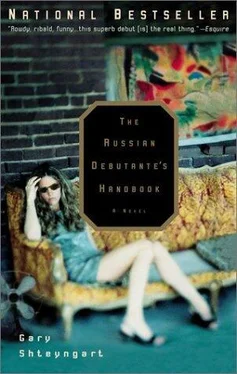Gary Shteyngart - The Russian Debutante's Handbook
Здесь есть возможность читать онлайн «Gary Shteyngart - The Russian Debutante's Handbook» весь текст электронной книги совершенно бесплатно (целиком полную версию без сокращений). В некоторых случаях можно слушать аудио, скачать через торрент в формате fb2 и присутствует краткое содержание. Город: New York, Год выпуска: 2003, ISBN: 2003, Издательство: Riverhead Books, Жанр: Современная проза, Юмористическая проза, на английском языке. Описание произведения, (предисловие) а так же отзывы посетителей доступны на портале библиотеки ЛибКат.
- Название:The Russian Debutante's Handbook
- Автор:
- Издательство:Riverhead Books
- Жанр:
- Год:2003
- Город:New York
- ISBN:0-7865-4177-6
- Рейтинг книги:4 / 5. Голосов: 1
-
Избранное:Добавить в избранное
- Отзывы:
-
Ваша оценка:
- 80
- 1
- 2
- 3
- 4
- 5
The Russian Debutante's Handbook: краткое содержание, описание и аннотация
Предлагаем к чтению аннотацию, описание, краткое содержание или предисловие (зависит от того, что написал сам автор книги «The Russian Debutante's Handbook»). Если вы не нашли необходимую информацию о книге — напишите в комментариях, мы постараемся отыскать её.
and
. The Russian Debutante’s Handbook Bursting with wit, humor, and rare insight,
is both a highly imaginative romp and a serious exploration of what it means to be an immigrant in America.
The Russian Debutante's Handbook — читать онлайн бесплатно полную книгу (весь текст) целиком
Ниже представлен текст книги, разбитый по страницам. Система сохранения места последней прочитанной страницы, позволяет с удобством читать онлайн бесплатно книгу «The Russian Debutante's Handbook», без необходимости каждый раз заново искать на чём Вы остановились. Поставьте закладку, и сможете в любой момент перейти на страницу, на которой закончили чтение.
Интервал:
Закладка:
The driver—a teenager by the looks of him, his shaved head tattooed with the anarchist’s goofy “A”—caught sight of this blood-bath in the rearview. “Out, out,” cried the anarchist driver. “No blood in auto! No HIV! Out!”
A stack of a hundred hundred-dollar bills hit the back of the driver’s head (Vladimir had thrown it with such force that it left a momentary red trace on that great moony surface). The driver looked down at the stash. He threw the little Trabant into gear.
The way to the airport required a quick U-turn, which a car any larger than a Trabant could not perform. In this respect, Vladimir was fortunate. In the respect that the U-turn took him straight into the Groundhog’s armada of BMWs and mafiyosi in retreat from the octogenarian Red Army, he was not.
His driver pressed on the horn dutifully and cursed as well, but with all the confusion up ahead he could not help but hit a large object, which Vladimir to his dying day would believe was Log. However, considering the glare of the afternoon sun and the blinding red flashes exploding around his corneas, he could have been wrong. It could have been a friend of the Log.
Nevertheless, the force of the impact steered the Trabant into the railing of the embankment. The Trabi, knowing a greater physical force when it crashed into one, bounced back into the street, saving Vladimir and his driver from a lapse into the river. A remarkable car, the Trabant! Such shyness and humility, such understated presence. Mother had always wanted Vladimir to marry a girl just like this Trabi.
“Car is dead!” the driver moaned, even as they made exceptional progress up the embankment and onto the bridge that snaked off from Prospekt Narodna. “Pay me!” Flustered and at the teenager’s mercy, Vladimir hit him with another ten thou, in response to which the driver pulled a confetti of wires and a single lightbulb out of the dashboard. This immediately sent the Trabant into heat: with terrific gusto and a transparent lack of regard for traffic signals they bounded through the Lesser Quarter and around Repin Hill.
A curtain of gray smoke rising from the Foot now blanketed the city, smoke as thick as the scalloped clouds one sees looking down from an airplane window. A premature night had descended upon Prava, coloring the spires and domes of the Old Town with an eerie industrial beauty.
By this point, the pain in Vladimir’s ribs was becoming acute. He broke down in a fit of coughing. There was something in his throat, a thick string of coagulated blood, and he pulled at it, pulled until the whole food chain unwrapped itself from within his stomach and landed on the driver’s bald pate.
For a second his cause seemed lost; for a second it looked like he would have to walk it to the airport. But all the driver said, in the meek, bewildered way of a proud local boy suddenly covered in a Westerner’s innards, was, “Pay me.” When the money fell alongside him, he gunned the engine once more.
Looking down at the city below them, Vladimir could see the BMW caravan making its way up the hill, one car on the heels of the next, forming a dark-blue river not unlike the Tavlata, except flowing a great deal more energetically and up the slope of Repin Hill. Vladimir shuddered, amazed at the power of the organization to which he once belonged, although a chain of luxury German automobiles was perhaps its most potent manifestation. Unless, of course, every link in that chain was strafing you with gunfire.
This happened a good ten minutes hence. The Trabant had quit the other side of Repin Hill and emerged onto the main highway leading out of the city. Vladimir was suffering from a dizzying attack of blood and tears. He was leaning his head back to keep the blood down and whispering to himself his father’s “no-tears” manifesto, when a bullet took out the back window of the Trabi. The tiny shards of glass drew fine red lines on the back of the driver’s head, complementing (rather befittingly) the tattooed “A,” symbol of the anarchists. “Ah!” shouted the driver. “Artillery is shooting to death car and Jaroslav! Pay me!”
Vladimir crept down into the pool of his own blood. The driver, Jaroslav, swerved into a no-man’s land between the guardrails and the freeway proper. The thin Trabant squeezed past a trailer truck in front of them bearing the logo of a Swedish modular-furniture company.
Shell-shocked, Vladimir crawled back up to look through the nonexistent window behind him. The Swedish furniture truck now separated their car from the Groundhog’s shooting party like some kind of ad hoc U.N. reaction force. But the Hog’s men apparently had no respect for Swedish furniture. With a singlemindedness common only to former Soviet interior-ministry troops and first-year law students, they continued to shoot as the truck swerved madly to stay on the road. Finally, their labors produced results—with an audible whoosh, the back doors of the truck blew away.
A houseful of Krovnik dining tables in assorted colors, Skanör solid-beech glass-door cabinets, Arkitekt retractable work lamps (with adjustable heads), and the daddy of them all—a Grinda three-piece sofa ensemble in “modern paisley,” came sailing out of the back of the truck and onto the flotilla of BMWs to settle once and for all the Russo-Swedish War of 1709.
THEY PULLED UPto the departure terminal. Vladimir, in a gesture of last-minute good will, threw another ten grand at Jaroslav, who slapped Vladimir’s sweat-soaked back, and, his own eyes now tearing, shouted: “Run, J.R.! One car still follows us!”
He ran, absentmindedly wiping the blood off his nose onto the already bloodied hand bandage. He slapped his passport on the desk of the half-awake security team guarding the departure gate. At that formal moment, his briefcase, stuffed with about fifty thousand dollars and a gun, came to mind. “Oh, pardon me,” said the ever-vigilant Vladimir. He hobbled over to the nearest trash can, sheepishly took out the gun, and, with a shrug of the shoulders, deposited that useless item within. “Don’t even ask about the gun,” he said to the nice, walrus-mustached gentlemen in dark green. “What a long day!”
“American?” said the security commandant, a tall individual, fit and lean, a shock of white hair beneath his beret. It was more of a statement than a question. With a minimum of malice, he told Vladimir to keep his blood-soaked hands off the spotless white counter, then stamped a childish picture of a departing plane into the passport and waved Vladimir through the gate. With ten minutes until departure, Vladimir prepared for a final sprint.
Directly behind him, Gusev and the Groundhog were running up to the security counter, buttoning up their double-breasters, straightening their ties, and shouting in Russian: “Stop the criminal in the bloodied shirt! The little criminal, stop him!”
Vladimir stopped, as if frozen by these hurtful words, but the security detail hardly turned around. “We don’t speak Russian here,” the commandant announced in Stolovan as the others laughed approval.
“Stop the international terrorist!” Gusev was hollering, still in the wrong tongue.
“Passport!” the chief hollered back at them in the international language of border police about to get more than a little surly.
“Soviet citizens don’t need passports!” cried the Groundhog, and, in a final suicidal gesture, leapt for the departure gate and Vladimir.
Vladimir continued to stand there, transfixed by the gaze in the eyes of Mr. Rybakov’s son, the crooked gaze of the same hatred, lunacy, and, in the end, hopelessness, that his father, the Fan Man, had worn like a badge… And then the eye contact was broken by so many swinging batons, well-aimed kicks in the groin, and an older man in uniform bent over the Groundhog and Gusev shouting revenge for the Soviet incursion of 1969.
Читать дальшеИнтервал:
Закладка:
Похожие книги на «The Russian Debutante's Handbook»
Представляем Вашему вниманию похожие книги на «The Russian Debutante's Handbook» списком для выбора. Мы отобрали схожую по названию и смыслу литературу в надежде предоставить читателям больше вариантов отыскать новые, интересные, ещё непрочитанные произведения.
Обсуждение, отзывы о книге «The Russian Debutante's Handbook» и просто собственные мнения читателей. Оставьте ваши комментарии, напишите, что Вы думаете о произведении, его смысле или главных героях. Укажите что конкретно понравилось, а что нет, и почему Вы так считаете.












